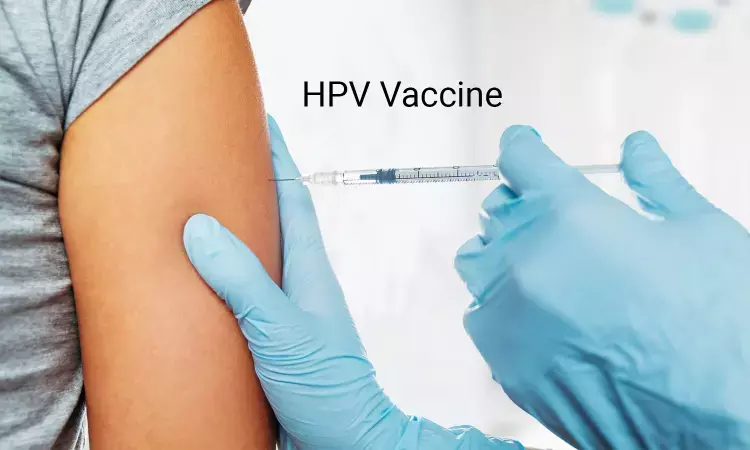- Home
- Medical news & Guidelines
- Anesthesiology
- Cardiology and CTVS
- Critical Care
- Dentistry
- Dermatology
- Diabetes and Endocrinology
- ENT
- Gastroenterology
- Medicine
- Nephrology
- Neurology
- Obstretics-Gynaecology
- Oncology
- Ophthalmology
- Orthopaedics
- Pediatrics-Neonatology
- Psychiatry
- Pulmonology
- Radiology
- Surgery
- Urology
- Laboratory Medicine
- Diet
- Nursing
- Paramedical
- Physiotherapy
- Health news
- Fact Check
- Bone Health Fact Check
- Brain Health Fact Check
- Cancer Related Fact Check
- Child Care Fact Check
- Dental and oral health fact check
- Diabetes and metabolic health fact check
- Diet and Nutrition Fact Check
- Eye and ENT Care Fact Check
- Fitness fact check
- Gut health fact check
- Heart health fact check
- Kidney health fact check
- Medical education fact check
- Men's health fact check
- Respiratory fact check
- Skin and hair care fact check
- Vaccine and Immunization fact check
- Women's health fact check
- AYUSH
- State News
- Andaman and Nicobar Islands
- Andhra Pradesh
- Arunachal Pradesh
- Assam
- Bihar
- Chandigarh
- Chattisgarh
- Dadra and Nagar Haveli
- Daman and Diu
- Delhi
- Goa
- Gujarat
- Haryana
- Himachal Pradesh
- Jammu & Kashmir
- Jharkhand
- Karnataka
- Kerala
- Ladakh
- Lakshadweep
- Madhya Pradesh
- Maharashtra
- Manipur
- Meghalaya
- Mizoram
- Nagaland
- Odisha
- Puducherry
- Punjab
- Rajasthan
- Sikkim
- Tamil Nadu
- Telangana
- Tripura
- Uttar Pradesh
- Uttrakhand
- West Bengal
- Medical Education
- Industry
2-dose HPV vaccine schedule provides sufficient protection for over 2 years: Study

Israel: After the last dose of a 2-dose 9vHPV vaccine regimen in boys and girls, antibody response persists through 2 to 2.5 years, finds a recent study in the journal Pediatrics.
The findings suggests that antibody response generated by administering 2 doses administered 6 to 12 months apart may be sufficient to induce high-level protective efficacy at least for 2 years after the second dose.
A recent international, randomized, open-label trial found human papillomavirus (HPV) antibody responses to the 9-valent human papillomavirus (9vHPV) vaccine among girls and boys (aged 9–14 years) receiving 2-dose regimens (months 0, 6 or 0, 12) to be non inferior to a 3-dose regimen (months 0, 2, 6) in young women (aged 16–26 years) 4 weeks after last vaccination. Jacob Bornstein, Galilee Medical Center and Azrieli Faculty of Medicine, Bar-Ilan University, Nahariya, Israel, and colleagues assessed response durability through month 36.
Girls received 2 (months 0 and 6 [0, 6]: n = 301; months 0 and 12 [0, 12]: n = 151) or 2 doses (months 0,2, and 6 [0, 2, 6]: n = 301). boys received 2 doses ([0, 6]: n = 301; [0, 12]: n = 150); and young women received 3 doses ([0, 2, 6]: n = 314) of 9vHPV vaccine. Using competitive Luminex immunoassay (cLIA) and immunoglobulin G-Luminex immunoassay (IgG-LIA) through month 36, the researchers assessed anti-HPV geometric mean titers (GMTs).
Key findings of the study include:
- Anti-HPV GMTs were highest 1 month after the last 9vHPV vaccine regimen dose, decreased sharply during the subsequent 12 months, and then decreased more slowly. GMTs 2 to 2.5 years after the last regimen dose in girls and boys given 2 doses were generally similar to or greater than GMTs in young women given 3 doses.
- Across HPV types, most boys and girls who received 2 doses (cLIA: 81%–100%; IgG-LIA: 91%–100%) and young women who received 3 doses (cLIA: 78%–98%; IgG-LIA: 91%–100%) remained seropositive 2 to 2.5 years after the last regimen dose.
"In girls and boys, antibody responses generated by 2 doses administered 6 to 12 months apart may be sufficient to induce high-level protective efficacy through at least 2 years after the second dose," wrote the authors.
The study titled, "Three-Year Follow-up of 2-Dose Versus 3-Dose HPV Vaccine," is published in the journal Pediatrics.
DOI: https://pediatrics.aappublications.org/content/147/1/e20194035
Dr Kamal Kant Kohli-MBBS, DTCD- a chest specialist with more than 30 years of practice and a flair for writing clinical articles, Dr Kamal Kant Kohli joined Medical Dialogues as a Chief Editor of Medical News. Besides writing articles, as an editor, he proofreads and verifies all the medical content published on Medical Dialogues including those coming from journals, studies,medical conferences,guidelines etc. Email: drkohli@medicaldialogues.in. Contact no. 011-43720751


